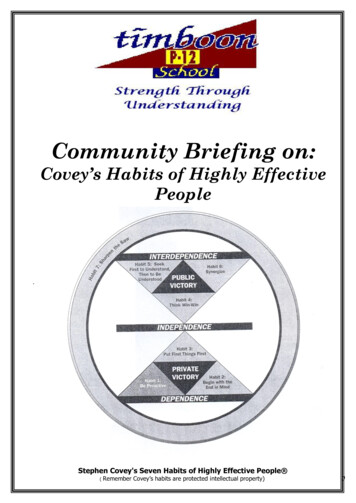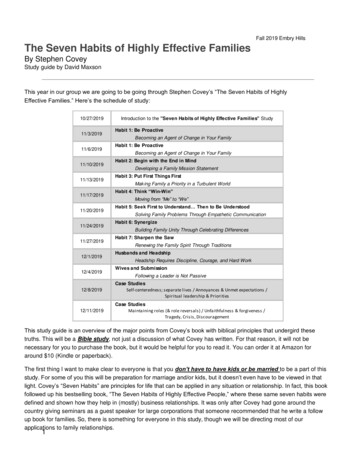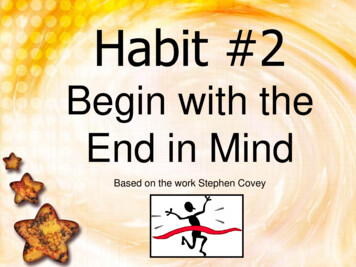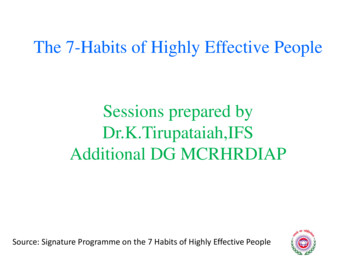
Transcription
The 7 Habits of HighlyDysfunctional LeadersAmerican Public Works AssociationAPWA Leadership & ManagementCommittee MemberJim Proce, ICMA-CM, PWLF, MBACity Manager Anna Texasjproce@annatexas.gov
Jim Proce City Manager, Anna Texas ACM PWD (3 times) VP water control district boardICMA-CM - credentialed managerAPWA-PWLFMBA - University of Central FloridaHarvard University Senior Executivein State and Local Govt Program APWA APWA Leadership & ManagementCommittee APWA Professional AwardsCommittee APWA Top Ten Award Committee TPWA Award Committee VP of the NCTB-TPWA APWA 2016 Top Ten Leader APWA 2011 Community Involvement NCTCOG PWERT, PWC, REPAC FEMA Subcommittee to NAC
APWA Leadership & Management Committee The Seven Habits of Highly DysfunctionalLeaders Covey’s inspiration but with a look in themirror Ted talks format in initial efforts Articles in December 2018 Reporter Training module on APWA Might be a book deal in our future Jonathan Gano, Public Works Director,Des Moines Chas Jordan, Principal, Radiant ConsultingLLC Jim Proce, City Manager, Anna Elia Twigg, Project Manager, TargetEngineering (Knowledge Team Member) Laura Kroeger, Program Manager, UrbanDrainage Flood Control District, DenverCO Harry Lorick, Principal, LA Consulting Inc. Bill Stogsdill, Public Works Director,Fairway KS
So what are the habits(dysfunctions)? Habit #1: Refusing To Make Decisions Habit #2: Not Doing What You Say You Will Do Habit #3: Not Doing What You Know You Should Be Doing Habit #4: Avoiding Responsibility Habit #5: Passive Aggressive Behavior Habit #6: Playing The Victim Habit #7: Resume Building Lots of Bonus Material (in the purchased training program)
Inspiration or what the?#1: Refusing to make a decision how often is the finished product of a meeting "let's haveanother meeting"unwilling to accept risk“This isn't the right time”ask for more datafrom living in the very short term#2: Not doing what you say you will do cutting bait on a promisedon't be a phonyquestions one's credibility in the long run#3: Not doing what you know you should be doing basic leadership tasks and higher order leadership:strategic planningperformance measurement/monitoringchecking in with the teammaintain morale#5: Passive/aggressive behavior: #6: Playing the victim #4: Avoiding responsibility: not my jobignoring basic problemsbadmouth direct reports or the boss when they're not aroundinsecure leadersno direct feedback, good or badinstructions are vaguecritical of unimportant thingshoarding of knowledge or informationbe willing to be the bearer of bad news, “this is what we’regoing to do” not “You’re not going to like this, but we have tobecause the boss said so.” Big difference.common in junior leaders, particularly those promoted out ofthe workgroup they now leadbasic motivation is that everyone wants to be liked and it's easy,in the moment, to blame "the boss" for unpopular instructions,policies, etc.critical to earning the trust of employees; increases insecurityNiccolo Machiavelli advised, “Princes should delegate to othersthe enactment of unpopular measures and keep in their ownhands the means of winning favors.” Good for a would-be‘prince’, but bad for a leader.#7: Resume building thinking we are indispensableempire building, even if it doesn't make sense. Bigger for thesake of bigger, not necessarily betternot in the best interests of the organization or community"it's hard to get a man to understand something when his salarydepends on his not understanding it."
Not DoingWhat You KnowYou Should Be Doing#3 of the 7 Habits of Dysfunctional LeadersJim Proce, ICMA-CM, PWLF, MBA
Not DoingWhat You KnowYou Should BeDoing - Ideas? This is an interesting topic and onemost of us would not admit we havedone So, for the sake of this discussion let’sjust assume we are talking aboutpeople we have observed in anotherorganization.
Passive resistanceProcrastinationThe NotDoing WhatYou KnowYou ShouldBe Doing ListOver-commitmentMediocre work lebrating
PassiveResistanceTHIS PROJECTASSIGNMENT ORTASK IS DUMBTHIS IS NOTWORTHY OF MYTIMEHE WON’TREMEMBER, SO IWON’TI AM REALLY BUSYON OTHERPRIORITIESIF ITS REALLYIMPORTANT HE’LLASK ME AGAIN
Betterapproach toPassiveResistanceGET CLARIFICATION ONDELIVERABLESSET SPECIFICEXPECTATIONSSEEK AGREEMENTCONSENSUS FORCOMPROMISEEXPLAIN YOURCHALLENGESTHE ALTERNATIVEWON’T LIKELY BE YOURDESIRED OUTCOME
DELIVERY OF BAD NEWSBAD NEWS DOESN’T GETANY BETTER WITH TIMEIN SOME CASES IT MAY GETWORSEProcrastinationPROBABLY BEST TO DO THISASAPBETTER IF YOU CRAFT THESTORY AND DELIVER APOSITIVE SLANT ON A BADSITUATION
WAITING UNTIL THELAST MOMENT, ORWORSE YET BEING LATEPROCESSINTERRUPTION; DERAILSOTHERS IN PROCESSDEPENDENCIES FAILEDREPUTATION BUILDING(IN A BAD WAY)IF YOU’RE IN THIS TRAPYOU NEED TO DIG OUTGET SOME WINS TOREBUILDProcrastination
Over-Commitment This is inadvertent procrastinationWhen you can’t say no to anyone or anythingWhen you are involved in too many thingsWhen you are actually good at what you do andeveryone knows it and you get loaded down When you are otherwise distracted by otherthings in your life
Mediocre WorkProduct This is where you do what you shouldbe doing But you just do the bare minimum,enough to get by, but certainly not yourbest and what is otherwise expected Good engineer/bad manager story You need to give things your best effort At worst get help and enlist others whomay like the undesirable task
Understanding what is important isimportantIf you are busy you need to haveprioritization skills a process and a regimentPrioritizationLeaving things to chance results in the wrongthings getting doneMake lists, use technology, white boardthings
PlanningThis is likely the mostobviousAs a manager or someonestriving to be a manageryou have to think aheadYou have think strategicallyand predictivelyAs a former public worksdirector I made decisionsfor things that may notoccur for yearsIf you are going to need atree, you need to plant theseed todayThose who need the treetoday, failed to plan
FOLLOW THE PLANBE PREPARED FORCHANGINGCONDITIONSDO WHAT YOUPROMISEDDO WHAT YOUPROMISED WHENYOU PROMISEDSO TELL ME, HOWLONG WILL THISTAKE?HOW DID I FIX THISGUY?Execution
Evaluating You should be measuring what you do and evaluatingthe results Many agencies measure tons of stuff Monthly reports that no one reads Lets pick no more than a half dozen things that areimportant and track those, with a strategy toovercome a challenge or deficit Failed inspections? Good or bad? Work orders? Good or bad?
Evaluating Debriefing/ after action reports What went well? What went poorly? What could we have done better? What did we learn from this? What actions do we need to plan for follow up?
When you do all those other things and good thingshappen Celebrate Show folks you careCelebrating Show folks you notice Show folks you are paying attention Which lead to one last items I didn’t have on the list
Fostering Relationships-Keys to the Vault Strategic Priorities Community City Council ManagementTeam/Peers Staff Self Tactical Priorities City Manager’sOffice (CEO) Budget City Secretary Payroll Purchasing Human Resources Operational Priorities EmployeesProjectsMaintenanceExpendituresVariance AnalysisProductivityBest Practices
Summing it up #3The Not DoingWhat You KnowYou Should BeDoing List Passive resistanceProcrastinationOver-commitmentMediocre work lebratingRelationships!
Confrontation
ConfrontationDo’s andDon’ts
Myths ofConfrontation
Leaders Lead by Example Act with Honesty & Integrity Get & Stay Organized Communicate Effectively Are Consistent Empower Others
Resources The “dysfunction” videos are available here on the APWA YouTube channel: https://youtu.be/flcXUzYQfMk?list PLbTAQf0hXtkr9Eoh0bJentNleQZnggpsw The 7 articles are found here (they are awesome & you should read them!) tional-leaders The entire program, should you want to get the entire program, can be foundhere: https://www.apwa.net/MYAPWA/Events/MyApwa/Apwa Public/Education and Events/Habits of Dysfunctional Leaders.aspx The 3rd habit presentation can be found here: ng-what-you-know-you-should-bedoing The closing act: https://youtu.be/Csk7dZGQtZc
The 7 Habits of Highly Dysfunctional Leaders American Public Works Association. APWA Leadership & Management Committee Member. Jim Proce, ICMA-CM,











